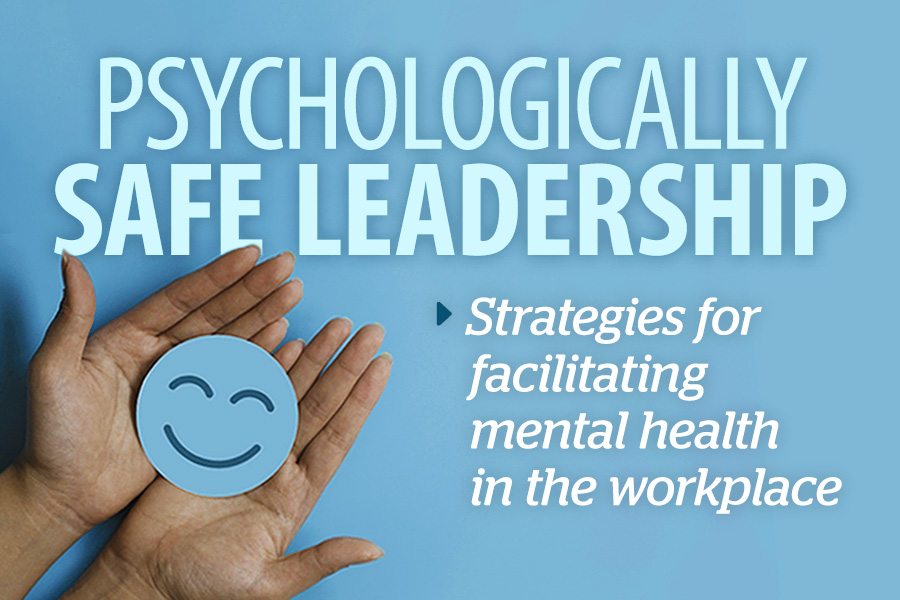
Psychologically safe relationships occur more frequently when leaders prioritize them
By Bill Howatt and Troy Winters
The manager-employee relationship is perhaps one of the most critical relationships facilitating employees’ psychological safety.

EDITOR’S NOTE: ‘Psychologically Safe Leadership: Strategies for facilitating mental health in the workplace’ is a web series in partnership with Dr. Bill Howatt of Howatt HR Consulting in Ottawa, and Troy Winters, senior health and safety officer at the Canadian Union of Public Employees (CUPE) in Ottawa.
Regardless of an organization’s type, sector, or geographic location, healthy interpersonal relationships in the workplace matter if the primary medium for defining success is dependent on employees’ decisions and behaviours.
Humans are social creatures who behave and think differently, whether they feel safe or fearful. COVID-19 has taught that people need people to feel connected and safe.
The manager-employee relationship is perhaps one of the most critical relationships facilitating employees’ psychological safety.
Psychological safety in the workplace occurs when employees are free from living with perceived or real fear. Leaders are advised not to assume that psychologically safe relationships happen without awareness, effort, and intention.
The art of facilitating psychologically safe, interpersonal relationships is not a perfect science because not all people are the same. Employees often have different preferences, expectations and values.
Leaders can provide support by being curious and acknowledging that they play an essential role in helping employees create psychologically safe relationships through observation, interactions, questions, and help when needed.
This mindset can help employees feel less fearful and more socially connected and secure, which can encourage them to take risks because they are tapping into their passion and creativity.
Tips for a leader to facilitate employee relationships
“Every worker needs at least one safe person to go to in their workplace.” – Troy Winters, CRSP
When employees experience pleasant emotions in the workplace, they are likely to be open, approachable, and willing to engage in active relationship building.
Leaders can help employees by not assuming things are fine, engage in open and safe conversations, and make building rapport with their employees a priority.
Personality provides insight into personal preferences
While leaders do not have to be psychologists, it is helpful to notice that not all their employees have the same work style and preferences for how work is done.
For example, not all employees enjoy sitting in team meetings for hours each day. Introverted employees typically want space to work alone where they can reflect and think. Extroverts tend to be OK working in groups for long periods.
Leaders can discover employees’ preferences through conversation
Knowing where employees fall on the continuum of introvert to extrovert enables them to deal with their preferences. Getting employees to do a self-assessment like the Introvert Versus Extrovert Quick Screen can spark conversations.
Knowing an introverted employee’s preference may allow them to opt out of a meeting where they do not feel they can add value.
“Just because an employee is assigned to a particular team does not mean they feel socially connected, welcomed, or safe.” – Dr. Bill Howatt
Social connections facilitate emotional well-being
Leaders are encouraged not to assume all their employees have authentic and safe relationships in the workplace. Showing up at team meetings in a good mood and spirit does not mean an employee feels connected.
It is helpful for a leader to build trust with their employees and help them make authentic connections. This provides them with safe peers with whom they feel confident sharing concerns, getting support, or asking questions.
Perceiving a lack of significant relationships in the workplace can increase employees’ risk of loneliness
Loneliness is a psychosocial hazard that contributes to negative thoughts and unpleasant emotions that impact employees’ emotional well-being.
Leaders can help employees by leveraging tactics such as promoting psychological support services, facilitating a buddy system, teaching how to navigate isolation and loneliness, and providing guidance on what employees can do for themselves.
Acknowledge that collaboration is not always easy
Most organizations’ success is dependent on employees being able to collaborate.
Psychologically safe leaders manage expectations.
When there is a need to motivate a team to hyper-focus on an initiative that requires collaboration, provide time for the team to get aligned and agree on action steps. Collaboration takes energy as it requires moving through different points of view to get agreement on what and when things will be done.
Do not assume collaboration is automatic. Help the team become clear on expectations, timeline, and the impact on other priorities.
Psychologically Safe Workplace Awards provide employers tools, data on mental health
An open office concept can be draining for employees
Some organizations have taken down physical walls to create more collaborative workspaces.
However, research reported in the Harvard Business Review indicates the opposite may be happening. Face-to-face interactions decreased by 70 per cent from the pre-open concept.
Why is this happening? One observation is many employees find being around people all the time taxes their mental energy reserves. This research’s notable negative coping mechanism is that many employees opt to self-manage how much they engage by withdrawing into themselves and interacting face to face only when necessary.
A psychologically safe leader pays attention to how the environment can positively and negatively impact the workplace’s employee experience and quality of relationships.
Leaders interested in facilitating interpersonal relationships can talk to their employees assigned to work in open spaces about how they are coping.
Remote work can be a barrier to building interpersonal relationships
Psychologically safe leaders accept that some employees may claim that working remotely is a positive, but it can have negative consequences.
Why? Relying heavily on video conferencing and virtual meetings challenges authentic connections.
A Harvard Business School study found that many workers who shifted to working from home had more meetings than in the workplace.
For extroverts who recharge by connecting with others, this may be tolerable and even enjoyable. However, for introverted employees, the need to be constantly “on” and on camera may be more challenging than working in an office.
Working from home does not provide informal opportunities for workers to have meaningful interactions with trusted colleagues. This is especially problematic for those who lean towards feeling lonely and isolated, an experience many reported during the pandemic.
 Dr. Bill Howatt is the Ottawa-based president of Howatt HR Consulting in Ottawa.
Dr. Bill Howatt is the Ottawa-based president of Howatt HR Consulting in Ottawa.

Troy Winters is a senior health and safety officer at the Canadian Union of Public Employees (CUPE) in Ottawa.